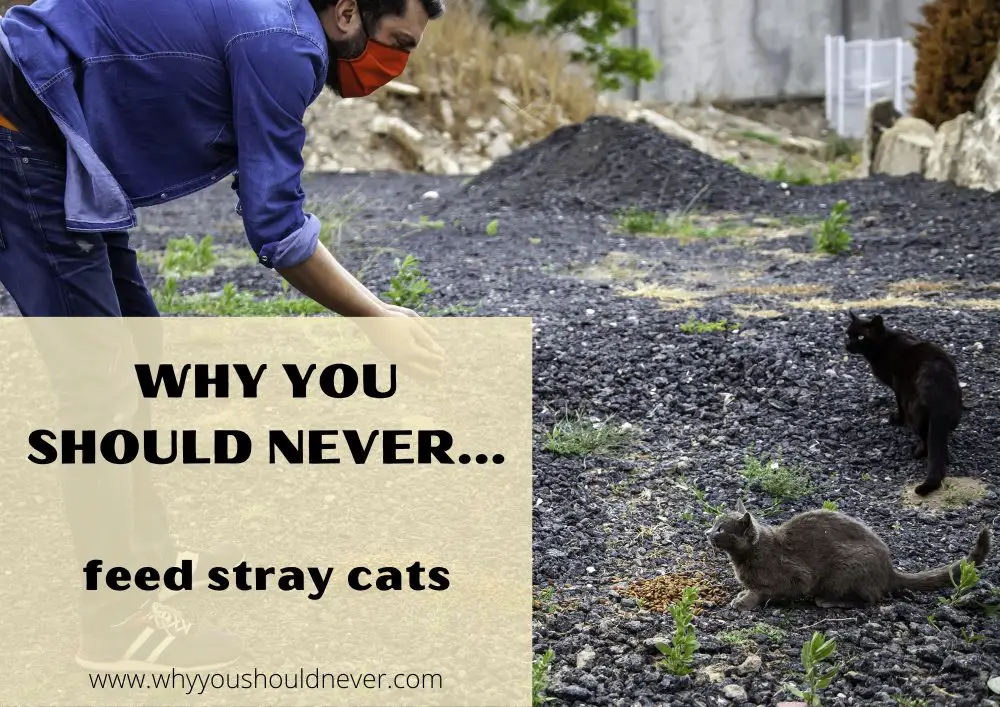![]()
Why You Should Never Feed Stray Cats
Ah, the sight of a cute little stray cat wandering around your neighborhood just tugs at your heartstrings, doesn’t it? You can’t help but feel sorry for the little fur ball and want to help it out by feeding it.
I’ve been there myself (more times than I’d like to admit). This need to feed random street cats usually stems from one of two places: you either love cats and wish you had one of your own, or you already do have one (or 7) of your own and thus identify with the plight of these poor, seemingly helpless creatures.
While it may be noble and altruistic to want to help stray cats, feeding them is not the solution. In fact, it can lead to more problems than you might realize. Read on to find out why.
7 reasons why you shouldn’t feed stray cats
1. Health risks
Feeding stray cats can pose a health risk to both cats and humans. Stray cats often carry diseases like rabies and toxoplasmosis. By feeding them, you’re increasing your risk of exposure to these diseases.
More often than not, stray cats have fleas and ticks, which can be transmitted to humans and other animals.
If you’re feeding them from a distance – say, by leaving food out on the sidewalk when they’re not around – you’d reduce the risks of exposure. But many people tend to get close to the cats and pet them while they eat, thereby increasing the risk of contracting something nasty.
And on top of all of that, strays are prone to aggression. So you could find yourself being attacked, bitten, or scratched, which in turn could lead to you getting sick.
2. Overpopulation
The more you feed something, the longer it sticks around!
When you feed strays, they tend to stay in the area and reproduce, resulting in more strays. Now, this might sound like Heaven to some (a city overflowing with adorable cats, what’s not to love?), but it’s not sustainable in the long run.
Overpopulation of stray cats would create a variety of problems, including a shortage of food and resources, increased risk of disease, noise pollution, and even aggression towards humans and other animals.
Feral cats also damage the environment and kill native wildlife, disrupting the ecosystem.
3. Dependency
When you feed a stray cat, you’re creating a dependency. This means that the cat will rely on you for food and will keep coming back for more. When you’re not around, the cat will struggle to find food and may even resort to scavenging through garbage cans.
Dependency also means that the cat won’t learn how to fend for itself, decreasing its chances of survival in the wild. This is especially true for kittens who learn survival skills from their mother.
4. Feeding attracts other animals
Cats aren’t the only animals that will be attracted to the food you’re leaving out for them. Other animals like raccoons, rats, and even coyotes may be attracted to the area, creating a potential danger for humans and their pets.
5. It’s expensive
Feeding cats can get pretty costly, especially if you’re doing it regularly. While a can of cat food may not seem like much, the cost can add up quickly, and you may find yourself spending more money than you intended, especially if your regulars tell their friends…
6. The food will likely be bad for them
It’s been a long-held belief that the food we feed our pets, just like the processed junk we feed ourselves, is terrible for their health.
So, if you want to keep the cats healthy, you’ll have to provide them with proper nutrition, which can be difficult to achieve with just scraps of food left over from your dinner, or the cheap, mass-produced cat food found in grocery stores.
If you don’t give them quality food, you might only be making them sick, as they’re not getting the nutrients they need.
7. It’s not a long-term solution
You may think your act of feeding strays is benevolent, and don’t get me wrong, it is. But it’s also a short-term fix to a long-term problem.
The truth is that stray cats need more than just a meal to survive. They need shelter, medical care, and a safe environment to live in.
Your act of kindness is only temporary and doesn’t address these underlying issues. It’s not a sustainable way to help the cats.
Final word
Doing a good deed is always commendable, but sometimes our good intentions can have unintended consequences. Feeding stray cats is one of those situations where you might think you’re helping, but in reality, you may be doing more harm than good.
Instead of simply feeding strays, consider contacting local animal shelters or rescue organizations to help address the root causes of stray cat populations. This way, you can ensure that these animals receive the care they need.
And if you are hellbent on feeding them, try to buy organic or natural cat food to ensure they’re getting the best nutrition possible.




